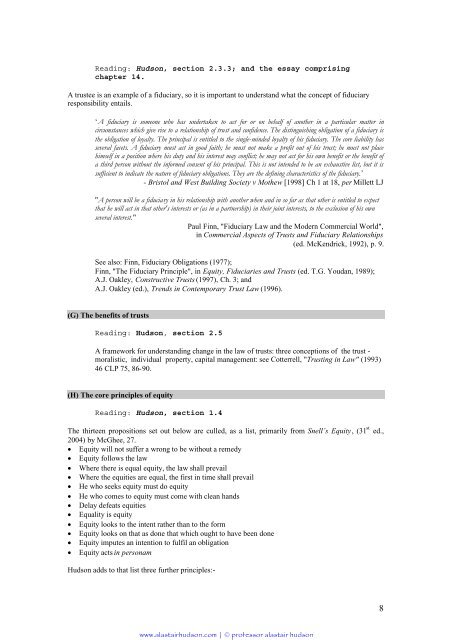Advanced Equity and Trusts Law - alastairhudson.com
Advanced Equity and Trusts Law - alastairhudson.com
Advanced Equity and Trusts Law - alastairhudson.com
You also want an ePaper? Increase the reach of your titles
YUMPU automatically turns print PDFs into web optimized ePapers that Google loves.
Reading: Hudson, section 2.3.3; <strong>and</strong> the essay <strong>com</strong>prising<br />
chapter 14.<br />
A trustee is an example of a fiduciary, so it is important to underst<strong>and</strong> what the concept of fiduciary<br />
responsibility entails.<br />
‘A fiduciary is someone who has undertaken to act for or on behalf of another in a particular matter in<br />
circumstances which give rise to a relationship of trust <strong>and</strong> confidence. The distinguishing obligation of a fiduciary is<br />
the obligation of loyalty. The principal is entitled to the single-minded loyalty of his fiduciary. The core liability has<br />
several facets. A fiduciary must act in good faith; he must not make a profit out of his trust; he must not place<br />
himself in a position where his duty <strong>and</strong> his interest may conflict; he may not act for his own benefit or the benefit of<br />
a third person without the informed consent of his principal. This is not intended to be an exhaustive list, but it is<br />
sufficient to indicate the nature of fiduciary obligations. They are the defining characteristics of the fiduciary.’<br />
- Bristol <strong>and</strong> West Building Society v Mothew [1998] Ch 1 at 18, per Millett LJ<br />
"A person will be a fiduciary in his relationship with another when <strong>and</strong> in so far as that other is entitled to expect<br />
that he will act in that other's interests or (as in a partnership) in their joint interests, to the exclusion of his own<br />
several interest."<br />
Paul Finn, "Fiduciary <strong>Law</strong> <strong>and</strong> the Modern Commercial World",<br />
in Commercial Aspects of <strong>Trusts</strong> <strong>and</strong> Fiduciary Relationships<br />
(ed. McKendrick, 1992), p. 9.<br />
See also: Finn, Fiduciary Obligations (1977);<br />
Finn, "The Fiduciary Principle", in <strong>Equity</strong>, Fiduciaries <strong>and</strong> <strong>Trusts</strong> (ed. T.G. Youdan, 1989);<br />
A.J. Oakley, Constructive <strong>Trusts</strong> (1997), Ch. 3; <strong>and</strong><br />
A.J. Oakley (ed.), Trends in Contemporary Trust <strong>Law</strong> (1996).<br />
(G) The benefits of trusts<br />
Reading: Hudson, section 2.5<br />
A framework for underst<strong>and</strong>ing change in the law of trusts: three conceptions of the trust -<br />
moralistic, individual property, capital management: see Cotterrell, "Trusting in <strong>Law</strong>" (1993)<br />
46 CLP 75, 86-90.<br />
(H) The core principles of equity<br />
Reading: Hudson, section 1.4<br />
The thirteen propositions set out below are culled, as a list, primarily from Snell’s <strong>Equity</strong>, (31 st ed.,<br />
2004) by McGhee, 27.<br />
� <strong>Equity</strong> will not suffer a wrong to be without a remedy<br />
� <strong>Equity</strong> follows the law<br />
� Where there is equal equity, the law shall prevail<br />
� Where the equities are equal, the first in time shall prevail<br />
� He who seeks equity must do equity<br />
� He who <strong>com</strong>es to equity must <strong>com</strong>e with clean h<strong>and</strong>s<br />
� Delay defeats equities<br />
� Equality is equity<br />
� <strong>Equity</strong> looks to the intent rather than to the form<br />
� <strong>Equity</strong> looks on that as done that which ought to have been done<br />
� <strong>Equity</strong> imputes an intention to fulfil an obligation<br />
� <strong>Equity</strong> acts in personam<br />
Hudson adds to that list three further principles:-<br />
www.<strong>alastairhudson</strong>.<strong>com</strong> | © professor alastair hudson<br />
8













